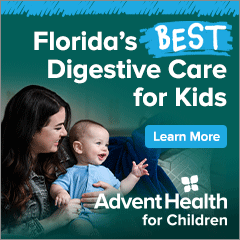A Team Effort
Using a collaborative approach, the Nemours Children’s Health Digestive Disorders and Gastrointestinal Surgery Center helps kids with complex conditions receive life-changing care.

There is perhaps no greater feeling for a parent than to see their children thriving in school and enjoying sports or hobbies side by side with their peers. But for those youngsters suffering from complex conditions affecting the stomach, pancreas, liver, colon, urinary tract or rectum, those opportunities to just be a kid can become few and far between without the proper medical guidance.
Fortunately for families in Central Florida, the Nemours Children’s Health Digestive Disorders and Gastrointestinal Surgery Center is not only the oldest and most complete program of its kind in the region, but is also renowned nationally for handling challenging cases and helping children return to the activities they love most.
“Our goal is always for this to be something that is not a main focus of their life and doesn’t determine what they’re able to do but is something that is manageable and that they forget about most of the time,” says Dr. Robert Dorman, a fellowship-trained surgeon who came to Nemours in 2023 to establish the colorectal program as part of the center. “That takes not only good care up front but also long-term care and becoming part of our family.”
Nemours accomplishes that mission with a collaborative approach, as its comprehensive, multidisciplinary team brings together colorectal surgeons like Dr. Dorman with gastroenterologists, urologists, dieticians and feeding therapists to share information and make life easier for the patients.
“Not only does that improve communication among those providers and create a clear plan for the family, but it also is just more convenient,” Dr. Dorman says. “You have improved communication, less travel, less resource utilization and one point of contact so the family can get clear answers.”
Some of the common issues Dr. Dorman treats include anorectal malformation, which is when a baby is born with a difference in anatomy of how their anus is constructed, and Hirschsprung’s disease, a condition that occurs in about one in 5,000 live births in which the lower part of the colon can’t relax. In both cases, surgeries are required along with continuous care such as diet or medication management.
Dr. Nick Poulos is another surgeon within the Digestive Disorders and Gastrointestinal Surgery Center. He spent 18 years at Nemours in Jacksonville, and after three years at another practice, is thrilled to be back with Nemours in Orlando to start a Level 1 pediatric trauma program.
Two rare conditions he treats are median arcuate ligament syndrome (MALS) and superior mesenteric artery (SMA) syndrome, which both present with similar abdominal pain but are quite different as far as the path of physiology and treatment.
“There are very few places around the country that deal with these two diagnoses,” Dr. Poulos says. “We’re fortunate at Nemours to have enough multidisciplinary caregivers that we can take care of them.”
MALS and SMA usually affect children in their teens, and the intense pain and nausea they experience often leads to them being unable to eat by mouth. Those with SMA are likely not able to attend school or engage in normal activities.
“For MALS, essentially what we do is divide the ligament that is compressing the artery, and once we relieve that ligament, the blood flow is pretty adequate to the liver, the pancreas, the stomach and the spleen, and the pain goes away,” Dr. Poulos says.
“With SMA, essentially the superior mesenteric artery pinches the duodenum, which is the first part of the small bowel between the aorta and the superior mesenteric artery. In that situation, we have to untuck the duodenum from between the two vessels. Moving the duodenum away from that hitch point allows them to pass food through without pain or nausea.”
The MALS procedure is done robotically, and patients can usually go home a day after surgery and have a positive outcome immediately. The SMA surgery requires a longer hospitalization and a convalescent period at home of a few months.
However, when these kids are able to eat again without pain—and enjoy ice cream, like one recent patient was eager to have—there is no better reward for the Nemours team.
“By the time they get to us with these particular diagnoses, they’ve been still for, in some cases, a couple of years, so their lifestyle has been changed dramatically,” Dr. Poulos says. “When the procedures work, it’s amazing: They get to go back to school, they get to eat again, and they get to do things they have not done for two or three years. It is definitely life-changing.”
Dr. Dorman finds the same fulfillment in the solutions he is able to provide, and that is why he is so proud to be part of the strides being made at Nemours—especially since he is a father of three himself.
“I can only imagine the stress of your child needing surgery or having a chronic medical condition,” he says. “I get the opportunity to connect with that family, to help them take some control over their lives by helping them to understand that condition, and in an age-appropriate way helping the kid understand what’s going on. The absolute best part of my job is to do a complex procedure that you know is going to make life better, and to come out and say to the parents, ‘Everything went great and here is the next step.’ To see their faces in that moment and to be able to relieve their anxiety is the coolest thing.”
Nemours Children’s Health
Orlando
(407) 650-7715
Nemours.org










